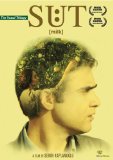| Reviews & Columns |
|
Reviews DVD TV on DVD Blu-ray 4K UHD International DVDs In Theaters Reviews by Studio Video Games Features Collector Series DVDs Easter Egg Database Interviews DVD Talk Radio Feature Articles Columns Anime Talk DVD Savant Horror DVDs The M.O.D. Squad Art House HD Talk Silent DVD
|
DVD Talk Forum |
|
|
| Resources |
|
DVD Price Search Customer Service #'s RCE Info Links |
|
Columns
|
|
|
Sut (Milk)
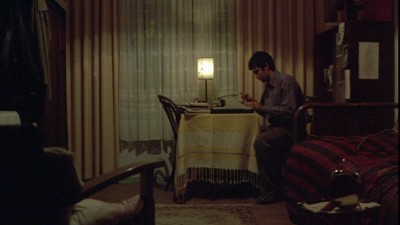
The second entry in Turkish director Semih Kaplanoglu's reverse-chronological "Yusuf trilogy," Süt finds Yusuf (here played in his late-teens/early-twenties incarnation by Melih Selcuk), the future modestly-famous Istanbul poet of the trilogy's first part, Yumurta (Egg), going through almost-post-adolescent ennui on the outskirts of Tire, the provincial town where he lives with his widowed mother. We find Yusuf here in the thick of the struggle, the adolescent split in his identity--between the artist and the rural-community-bound son, the cosmopolitan urbanite and the traditional Muslim--that had already come to its fullest, most alienated point in the preceding film. And Süt is, itself, the "adolescent" of the trilogy, with its concurrently evident growing pains, compelling uncertainty, and more advanced, adventurous attempts to branch out and experiment aesthetically.
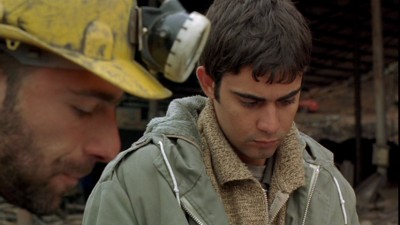
As Yusuf awaits his draft notice (all Turkish males are required to do a stint of military service), he makes a sincere, ambitious stab at being a poet, submitting his work to small journals, nagging the postmaster for replies that seem never to come, and following around an addled, drunken professor who evidently offered him encouragement at some point. He also pursues the more prosaic activities of youth, trying to make headway with the girls that interest him and halfheartedly aiding his mother with their small, struggling dairy and door-to-door milk sales service. When one of his submissions is finally accepted by a small poetry journal, his exhilarating success is counteracted by his ambivalence over being found physically unfit for his military service (a dishonor in Turkish society) because of an illness--most likely a form of epilepsy that runs in his family (judging from otherwise unexplained, unexpected, yet naturalistically played-out episodes of seizure/fainting depicted in all three films); by his discovery of his mother's clandestine dating of a local gentleman, a widower with a teenaged daughter; and, most especially, by the guilt he feels over being published and having real prospects for a future career as a poet in the face of the grim destiny of his less fortunate friend, an equally (if not more) talented aspiring poet who, it seems, will be consigned by inequitable economic circumstance to a life of drudgery as a miner.
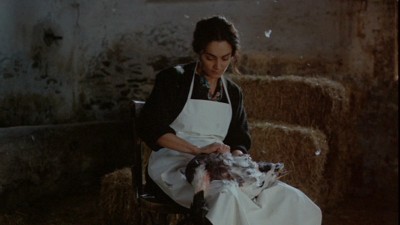
Yusuf, like most going through the turbulent time of life in which Süt finds him, is having trouble figuring out what he can, should, or wants to do in life, a situation not exactly helped by his generally supportive and caring mother, who nags him about spending more time at the typewriter than peddling milk to keep them sheltered and fed. When his mother's affair makes her the one who is guilty of neglecting the family welfare, and Yusuf discovers her outside interest in someone else's family, his rage threatens to bring him to rashly violent action. But a dreamlike, somewhat surreally depicted series of revelations and realizations--a visualization of his own poetic sensibility helping him make sense of his emotions, perhaps--lead him to an epiphany that calms him by, contradictorily but convincingly, making his mother appear as a painterly vision both more distant from him and more understandably human, a transformation from nagging, omnipresent caretaker to revered but less immediate, less viscerally felt, and less influential enigma. There is no such resolution of the guilt for Yusuf's lost/abandoned friend and might-have-been colleague, whom he has promised to help and then forgotten in the wake of his own concerns.
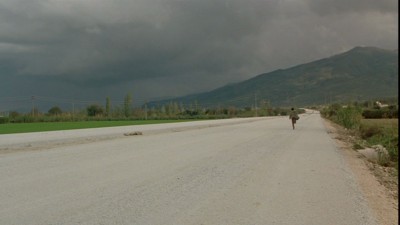
Süt's tone and sensibility are in many ways extensions from those of Yumurta (the cinematographer is once again the gifted Ozgur Eken, the more prevalent than usual art direction again by Naz Erayda), but the results are less controlled. That is not necessarily a bad thing; some of the dream/poetic-memory sequences do stray a bit too far into incongruously whimsical/bizarre, Felliniesque territory--a recipe for pretention if the content fails to meet up with the style just so--but more often, we are left in a state of truly curious anticipation for what wondrous, unexpected, beautifully filmed places the film is taking us next, however ambiguous or dense to the point of opaqueness its logical sense might be. It is fitting that this middle part of the Yusuf trilogy, the one that chronicles the protagonist's adolescence, is its most awkward, uneven, ebullient, sometimes inscrutable or incoherent, dreamy, always passion- and emotion-infused entry. In a way, its not always perfectly blended mix of confusion, guilt, melancholy, hope, anger, and rebellion creates a tone that is more, or at least equally, appropriate to depicting adolescence as the raunch of American Pie or the wish-fulfillment romanticism of John Hughes.
THE DVD:
The care Olive Films has taken in presenting Süt is something of an improvement over their treatment of Yumurta, the main point of superiority being this film's anamorphic widescreen presentation at an aspect ratio of 1.85:1 (Yumurta was, somewhat disappointingly, non-anamorphically letterboxed). The rich, beautifully lit and composed cinematography and meticulous art direction shine through vibrantly in a well-above-average transfer of a film whose visuals need to be seen as close to their originally intended photographic exquisiteness as possible.
Sound:The disc's Dolby Digital 2.0 stereo soundtrack is just fine, with all the film's dialogue and ambient sound present and accounted for in crystal-clear and entirely undistorted form.
Extras:None.
FINAL THOUGHTS:Aptly the least even episode of Semih Kaplanoglu's Yusuf trilogy, Süt finds the filmmaker wandering away from the more controlled structure of the preceding installment, Yumurta, aesthetically and narratively expanding and meandering a bit through Yusuf's adolescence on our way backward in time to his childhood, which will be recounted in the third and final (and chronologically "first") film of the triad. But that meandering is, surprisingly often, rather fitting for an exploration of the least stable, most inconsistent time in most people's lives. Süt is ultimately a sensitive, visually gorgeous (as usual for Kaplanoglu) delve into the troubled dreams and dissatisfying yet wide-open, unpredictable reality of our ever-conflicted protagonist's post-teen transitional limbo, the shaky bridge between his relatively uncomplicated childhood and his free, successful, but alienated adulthood. Recommended.
|
| Popular Reviews |
| Sponsored Links |
|
|
| Sponsored Links |
|
|
| Release List | Reviews | Shop | Newsletter | Forum | DVD Giveaways | Blu-Ray | Advertise |
|
Copyright 2024 DVDTalk.com All Rights Reserved. Legal Info, Privacy Policy, Terms of Use,
Manage Preferences,
Your Privacy Choices | |||||||









